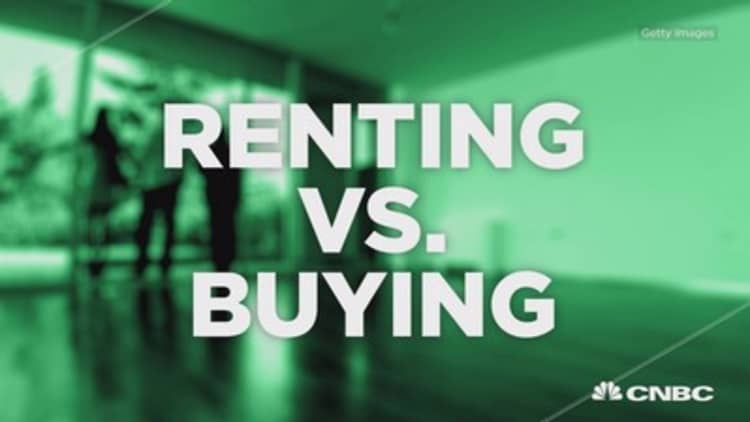
More millennials are moving into the real estate market. About 65 percent of people ages 25 to 34 years old surveyed by Realtor.com in mid-June said they plan to buy in the next three months.
But buying is not always the best option. When deciding one of the biggest financial decisions of your life, keep these things in mind to see if you're better off buying or renting.
Read MoreMillennials leasing more than ever
Here's where it makes sense to rent:
You have limited funds. If you don't have the money for a down payment and additional costs of owning a home, renting is the best option. Use rent-versus-buy calculators at Trulia or Bankrate.com to see what you can afford.
You are uncertain about your employment. If you are unsure about your job situation or living paycheck to paycheck, focus on conserving cash for future living expenses and building up your emergency fund, said Evelyn Zohlen, a certified financial planner and president of Inspired Financial in Huntington Beach, California.
Read MoreIs Gen Y worse off than Gen X was?
You have a short-term time horizon. If you are on a work assignment that lasts two years or less, it makes more sense to rent rather than taking on the high transaction costs of purchasing a home. Same goes if you plan to move in the next couple of years or want to start a family in a few years. On a similar note, if you are going through a significant life transition, like divorce or loss of a spouse, renting is a better idea while you get a little better footing.
But you are better off buying if:
You can cover the additional costs of owning. Make sure you can pay the down payment and closing costs before buying a home. "Most banks still want a 20 percent down payment," said Ryan Severino, a senior economist and director of research at commercial real estate data provider REIS. So if you are purchasing a $250,000 home, a 20 percent down payment would be $50,000. That's in addition to a typical 5 to 6 percent in commissions plus another 1 percent in closing costs. Maintenance costs are also a big factor to budget for.
Read MoreBoost your paycheck, millennials
You plan to stay in the home at least five years. It's best to buy when you have the "long-term horizon," Zohlen said. Staying in a house that you buy for five years or more means you are more likely to recoup what you paid in transaction costs and generate a return on your investment.
You want to reap the financial benefits of homeownership. Low interest rates make homeownership attractive because it decreases the amount borrowers pay on their loans. Mortgage rates remain near record lows after the 2008 financial crisis. The average rate on a 30-year fixed-rate mortgage is 3.9 percent, according to Bankrate. If you itemize your federal return and don't qualify for the alternative minimum tax, you can deduct your mortgage interest and property taxes from your tax obligations. And most importantly, you can build equity in your home, something that isn't possible with a rent payment.


